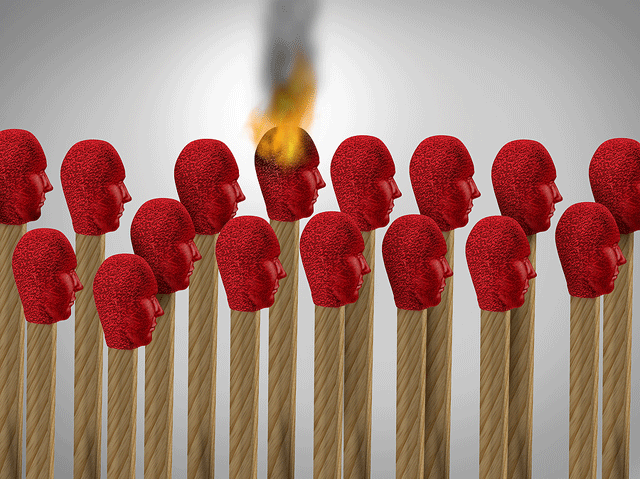By SaraKay Smullens
Are you waking up with a lump in your throat that never used to be there? Is there an ache inyour chest — best described as heartache — relatively new to you? Do you look at your children, fearing for their future and well-being? Do your eyes fill with tears, but you are not sure why?
If so, I join you. We are experiencing societal burnout. We are overburdened by a perfect storm of threatening societal challenges and a fiercely divided electorate. We are overwhelmed by moral distress due to those in positions of power and influence who, rather than address grave challenges, skillfully work to pit citizens against each other, intensify fear and anxieties, and undermine the rule of law to gain control and power.
In 1974, psychologist Herbert Freudenberger was the first to identify the burnout syndrome: Due to excessive demands on energy, strength and resources, a person becomes over-whelmed, exhausted and “inoperative.” Although they did not use the term burnout in their groundbreaking 1970 book “Future Shock,” Alvin and Heidi Toffler predicted that the breath-taking pace of our technological revolution would bring unsettling change, challenge and increased crime. They warned that the illiterate of the future would no longer be those who can’t read or write but rather those unable to keep up with the demands of rapid change.
To cope, the Tofflers stressed preparing for the future with insight and creativity, implicitly calling on leaders to bring us together rather than exacerbate division.
That we as a society have failed in this eff ort became shockingly clear before the 2016 presidential election when client after client told me that America had forgotten them. This anger and frustration played an enormous role in the victory of Donald Trump, who was, and continues to be, seen as an ally of those who feel discarded and invisible.
The sense of isolation my clients shared caused me to intensify my research into the complexities of burnout — how it’s different from depression and what exactly has gone so very wrong. I’ve shared my findings at conferences, as well as social gatherings and book clubs, where I’ve focused on staying sane in a world gone mad.
Here are the basics of what I’ve learned: We are overlooking the process of how people develop into healthy, resilient, creative members of a family and a society, which is so necessary in this time of overload. There is an inevitable interactivity between personal development and the quality of political leadership.
Key to our future is offering children what they need for mature development: Specifically, children must feel loved and safe, which millions of children worldwide are denied. This said, something has gone terribly wrong in the lives of seemingly fortunate children, those who do not live in war-torn countries, are not abused in any apparent way and live in households that are economically sound. Yes, social media platforms are a monster, made more dangerous by deceptions nurtured by artificial intelligence, and tragically, our children are vulnerable to tormentors and bullies outside our homes. Yet, within our homes, far too many children are not properly nurtured.
Far too many are fed a diet of hatred and prejudice. Far too many are overindulged, raised to believe they are more special than others. And too many parents fear imposing necessary boundaries and limits. As a result, many children are denied the opportunity to develop dignity, a state of being that begins with love and is a prerequisite for mental health. It is dependent on pride — “I am a valuable human being” — and humility — “All others are as important and valuable as I am.”
Dignity is rooted in respect, self-awareness and awareness of others, and character, in other words. It allows one to listen deeply and question assumptions. It encourages respectful communication between those who disagree and fosters the ability to recognize those who cannot be trusted.
Tragically and dangerously, children denied the development of dignity express anger and emptiness through hatred and prejudice toward others. Without developing insight, they reach adulthood biologically but not emotionally. In essence, they are aging, fearful children. For them, love remains a foreign concept.
Many such “adults” become bullies and dictators. In democracies, they may assume positions of power and dominance in professional settings, on boards, and in elected or appointed office. Those without confidence or character cling to the perks their positions of power offer. Some may cling to pure fantasy: They wish to turn the clock back to a time that can never return. Still others, longing for a quality of parenting they never received, become fiercely devoted followers.
Eliminating societal burnout requires recognition of the essential link between personal development and trustworthy leadership, necessary in democracies for the survival of all we hold dear.
At the core of all trustworthy leadership is the ability to love. Dignity makes it possible.
SaraKay Smullens is an award-winning Philadelphia-based licensed clinical social worker, certified family life educator and writer whose latest book is “Burnout and Self-Care in Social Work: A Guidebook for Students and Those in Mental Health and Related Professions.”
Chicago Tribune, November 24, 2023


















